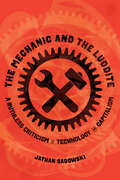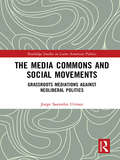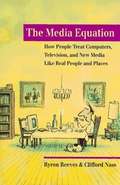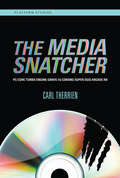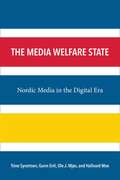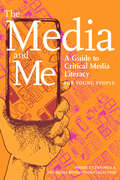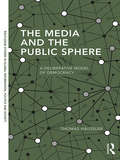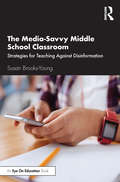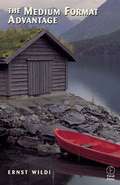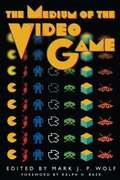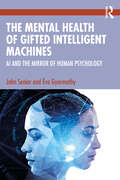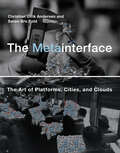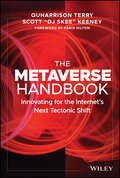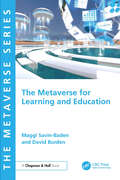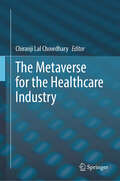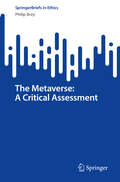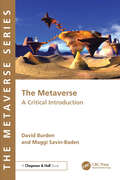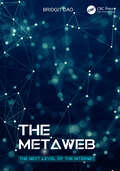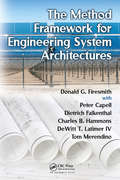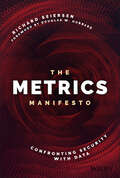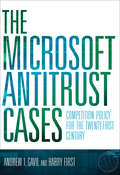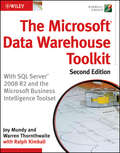- Table View
- List View
The Measure of All Minds
by José Hernández-OralloAre psychometric tests valid for a new reality of artificial intelligence systems, technology-enhanced humans, and hybrids yet to come? Are the Turing Test, the ubiquitous CAPTCHAs, and the various animal cognition tests the best alternatives? In this fascinating and provocative book, José Hernández-Orallo formulates major scientific questions, integrates the most significant research developments, and offers a vision of the universal evaluation of cognition. By replacing the dominant anthropocentric stance with a universal perspective where living organisms are considered as a special case, long-standing questions in the evaluation of behavior can be addressed in a wider landscape. Can we derive task difficulty intrinsically? Is a universal g factor - a common general component for all abilities - theoretically possible? Using algorithmic information theory as a foundation, the book elaborates on the evaluation of perceptual, developmental, social, verbal and collective features and critically analyzes what the future of intelligence might look like. Provides a universal framework integrating the evaluation of development, social and communication skills, and collective intelligence Compares the behavior evaluation of humans, non-human animals, and computers Blends cutting-edge theory and technology with historical context
The Mechanic and the Luddite: A Ruthless Criticism of Technology and Capitalism
by Dr. Jathan SadowskiThis short book demystifies how the two systems of technology and capitalism work together and equips readers with practical tools to dismantle them and build a better world, bit by bit. Our society is constantly made to serve the needs of two systems: technology and capitalism. Neither exists outside humans, but both are treated as above and beyond us. The Mechanic and the Luddite offers the critical tools needed to deconstruct these systems—how they work, whom they work for, and what work they do in our lives. With signature style and energy, Jathan Sadowski presents a provocative one-stop shop for understanding the political economy of technology and capitalism. Each chapter breaks down key features of technological capitalism, offering sharp, synthetic, and authoritative analysis of topics like innovation, labor, data, and risk. It's not enough to know how the machinery of capitalism is put together and how its parts operate; we must also know whom the machines serve and when they should be taken apart, to be rebuilt for new purposes or destroyed for good. The Mechanic and the Luddite provides the political guidance needed to make these crucial decisions.
The Media Commons and Social Movements: Grassroots Mediations Against Neoliberal Politics (Routledge Studies in Latin American Politics)
by Jorge Saavedra UtmanWhat does it mean to have a voice in a formal democracy operating under neoliberal guidelines and with an almost entirely private media system? How can the people gain their voice and engage in a dialogue with hegemonic actors and discourses? In this book, Jorge Saavedra Utman examines the role of media and communicative practices during one of the largest social mobilizations in Latin America in the last 30 years: Chile’s 2011 students’ movement. Saavedra Utman observes the eye-catching, subversive, but also intimate practices that, in a country with a liberal democracy and neoliberal policies, allowed people to speak up and become political actors from grassroots positions. Presenting rich qualitative data that is sourced from interviews and focus groups with activists, he introduces a fresh perspective on the study of media and communications and social movements. Saavedra Utman paints a clearer picture of contentious events since 2011 - like the Arab Spring and Occupy – to understand the relevance of media and communications in contemporary quests for participation and democracy. Promising to be an important book, The Media Commons and Social Movements represents a significant contribution to our understanding of communicative dimensions of protest and social change.
The Media Equation: How People Treat Computers, Televisions, and New Media Like Real People and Places
by Byron Reeves Clifford NassAccording to popular wisdom, humans never relate to a computer or a television program in the same way they relate to another human being. Or do they? The psychological and sociological complexities of the relationship could be greater than you think. In an extraordinary revision of received wisdom, Byron Reeves and Clifford Nass demonstrate convincingly in The Media Equation that interactions with computers, television, and new communication technologies are identical to real social relationships and to the navigation of real physical spaces. Using everyday language, the authors explain their novel ideas in a way that will engage general readers with an interest in cutting-edge research at the intersection of psychology, communication and computer technology. The result is an accessible summary of exciting ideas for modern times. As Bill Gates says, '(they) ... have shown us some amazing things'.
The Media Snatcher: PC/CORE/TURBO/ENGINE/GRAFX/16/CDROM2/SUPER/DUO/ARCADE/RX (Platform Studies)
by Carl TherrienAn in-depth exploration of a neglected video game platform of the 1990s and a reflection on the way we construct the cultural history of video games.In The Media Snatcher, Carl Therrien offers an in-depth exploration of NEC's PC Engine/TurboGrafx-16, a little-studied video game platform released in the late 1980s. The PC Engine was designed to bring technological expandability to the world of game consoles; The Media Snatcher's subtitle evokes some of the expansions and the numerous rebranded versions of the system released by NEC, including the first CD-ROM add-on in video game history. The platform makers hoped that expandability would allow its console to remain at the cutting edge and even catch up with such perceptually rich media as cinema and anime. More than a simple shape-shifter, the PC Engine became a media snatcher.Therrien examines the multidirectional interactions of video game technologies, commercial structures, and cultural dynamics. He considers, among other things, hyperbolic marketing and its impact on how we construct video game history; glitches, technological obsolescence, and the difficulty of conducting media archaeology of the recent past; the emergence of male-centered power fantasies through audiovisual rewards; the rise of original genres such as visual novels; and the sustained efforts to integrate PC Engine software in the sprawling media landscape of Japan (where the PC Engine found much of its success). Avoiding the usual techno-industrial glorification, Therrien recounts the bold technological aspirations of the platform makers and the struggles to make the actual technology realize its potential.
The Media Welfare State: Nordic Media In The Digital Era
by Ole J. Mjøs Hallvard Moe Trine Syvertsen Gunn Sara EnliThe Media Welfare State: Nordic Media in the Digital Era comprehensively addresses the central dynamics of the digitalization of the media industry in the Nordic countries--Sweden, Norway, Denmark, Finland, and Iceland--and the ways media organizations there are transforming to address the new digital environment. Taking a comparative approach, the authors provide an overview of media institutions, content, use, and policy throughout the region, focusing on the impact of information and communication technology/internet and digitalization on the Nordic media sector. Illustrating the shifting media landscape the authors draw on a wide range of cases, including developments in the press, television, the public service media institutions, and telecommunication.
The Media and Me: A Guide to Critical Media Literacy for Young People
by Mickey Huff Andy Lee Roth Nolan Higdon Ben Boyington Allison T. ButlerFrom foundations in critical thinking skills to practical tools and real-life perspectives, this book empowers young adult readers to be independent media users.During the recent presidential election, &“media literacy&” became a buzzword that signified the threat media manipulation posed to democratic processes. Meanwhile, statistical research has shown that 8 to 18 year-olds pack more than eleven hours with some form of media into each day by &“media multitasking.&” Young people are not only eager and interested to learn about and discuss the realities of media ownership, production, and distribution, they also deserve to understand differential power structures in how media influences our culture.The Media and Me provides readers with the tools and perspectives to be empowered and autonomous media users. The book explores critical inquiry skills to help young people form a multidimensional comprehension of what they read and watch, opportunities to see others like them making change, and insight into their own identity projects. By covering topics like storytelling, building arguments and recognizing fallacies, surveillance and digital gatekeeping, advertising and consumerism, and global social problems through a critical media literacy lens, this book will help students evolve from passive consumers of media to engaged critics and creators.The Media and Me is a joint production of The Censored Press and Triangle Square Books for Young Readers.
The Media and the Public Sphere: A Deliberative Model of Democracy (Routledge Studies in Global Information, Politics and Society)
by Thomas HäusslerAt the heart of modern democracy lies the public sphere, which is most centrally shaped by those actors that integrate it discursively: the mass media. The media draw together the different strands of political debates; they grant access to some actors and arguments while excluding others and thus decisively mould the political process. In this book, Thomas Häussler examines how the media reflect and react to the wider context in which they are embedded. More specifically, he focuses on whether their discourse demonstrates systematic differences with regard to the two main public sphere types that they co-constitute, according to deliberative theory, focussing in particular on the work of Jürgen Habermas. The Media and the Public Sphere promotes a deeper and more detailed understanding of the political process by foregrounding the complex relationships between the media and the public discourse they constitute. It examines how the media co-create relationships of power, analyses the structure of these discursive networks and illuminates the effects that different deliberative coalition types have on political debates.
The Media-Savvy Middle School Classroom: Strategies for Teaching Against Disinformation
by Susan Brooks-YoungThe Media-Savvy Middle School Classroom is a practical guide for teachers of Grades 5-8 who want to help their students achieve mastery of media literacy skills. Today’s fake news, alternative facts, and digital manipulations are compromising the critical thinking and well-being of middle grade learners already going through significant personal changes. This actionable book prepares teachers to help their students become informed consumers of online resources. Spanning correct source use, personal versus expert opinions, deliberate disinformation, social media, and more, these ready-to-use activities can be integrated directly into existing language arts and mathematics lesson plans.
The Mediated Climate: How Journalists, Big Tech, and Activists Are Vying for Our Future
by Adrienne RussellTo what extent does journalism deserve blame for the failure to address climate change over the last thirty years? Critics point out that climate coverage has often lacked necessary urgency and hewed to traditional notions of objectivity and balance that allowed powerful interests—mainly fossil fuel companies—to manufacture doubt. Climate journalism, however, developed alongside the digital media landscape, which is characterized by rampant misinformation, political polarization, unaccountable tech companies, unchecked corporate power, and vast inequalities. Under these circumstances, journalism struggled, and bad actors flourished, muddling messages while emissions mounted and societies struggled to avert catastrophe.The Mediated Climate explores the places where the climate and information crises meet, examining how journalism, activism, corporations, and Big Tech compete to influence the public. Adrienne Russell argues that the inadequate response to climate change is intertwined with the profound challenges facing the communications environment. She demonstrates that the information crisis is driven not only by technological changes but also by concentrated power that predates the rise of digital media companies. Efforts to improve climate coverage must take into account the larger social and material contexts in which journalism operates and the broader power dynamics that shape public discourse. Drawing on interviews with journalists and activists, Russell considers the ways recent movements are battling misinformation. She offers timely recommendations to foster engagement with climate issues and calls on readers to join in efforts to reshape the media landscape to better serve the public interest.
The Mediatrician's Guide: A Joyful Approach to Raising Healthy, Smart, Kind Kids in a Screen-Saturated World
by Michael Rich, MD, MPHGain the confidence you need to raise a child well in the digital age.In this positive, science-based approach, Dr. Michael Rich addresses your questions and concerns about your childrens&’ screen time and media use. The Mediatrician&’s Guide empowers you to guide your family toward smart and healthy digital choices.Known as the &“Mediatrician&” due to his acclaimed work as a pediatrician, child health researcher, and children&’s media specialist, Dr. Rich presents a compassionate and encouraging look at the reality of growing up in a screen-saturated world. You won&’t find fearmongering here—just accessible explanations, case studies, and practical tips to help your kids thrive in a technology-rich environment and emerge as happy, well-informed, empathetic adults.Features include:Ask the Mediatrician: Questions and answers based on Dr. Rich&’s long-running advice column and podcastMedia Rx: Prescriptive content based on insights from the Digital Wellness Lab and the Clinic for Interactive Media and Internet DisordersYou Can: Straightforward instructions for what you can do to guide your child in the digital landscapeDigital Wellness Primer: A one-stop resource for actionable advice that you can customize for your family&’s specific needsBacked by evidence as well as decades of professional and personal practice, The Mediatrican's Guide will give you peace of mind and your kids much-needed tools to navigate the digital environment in a way that reduces the risks to their physical and mental health and their emotional and social development..&“A caring, wise, and joyful guide to the possibilities and the perils of our increasingly more digital existence.&”—Marlo Thomas, activist, actor, and author&“This book is a must-have and will soon become your best friend, full of daily tips and long-lasting wisdom.&”—Sanjay Gupta, MD,associate professor of neurosurgery, Emory, and chief medical correspondent, CNN
The Medium Format Advantage
by Ernst WildiLearn the advantages and capabilities of medium-format cameras and examine all aspects of medium-format operations, including SLR, twin lens, panoramic, rangefinder, wide angle, press, and view cameras. Also explained and illustrated are lenses and their accessories, motor drives, films, flashes, filters, slides and slide projectors, and more. Includes black and white and color photographs and drawings to illustrate proper use of equipment and various techniques, effects, and possibilities that produce successful photographs with the best possible image quality. The medium format is truly the format in the middle. It combines many of the benefits of 35 mm photography with those of the large format, making a medium format system an excellent choice for almost all types of photography from candid action with a hand-held camera to critical studio work from a tripod. Special chapters are devoted to these different applications and the type of equipment that most likely meets your photography needs. This book explains clearly the medium format's benefits, advantages, and disadvantages and provides a comparison of the medium format to other formats so you can decide whether it is right for you and your photography.
The Medium of the Video Game
by Mark J. P. WolfOver a mere three decades, the video game has become the entertainment medium of choice for millions of people, who now spend more time in the interactive virtual world of games than they do in watching movies or even television. The release of new games or game-playing equipment, such as the PlayStation 2, generates great excitement and even buying frenzies. Yet, until now, this giant on the popular culture landscape has received little in-depth study or analysis. In this book, Mark J. P. Wolf and four other scholars conduct the first thorough investigation of the video game as an artistic medium. The book begins with an attempt to define what is meant by the term ""video game"" and the variety of modes of production within the medium. It moves on to a brief history of the video game, then applies the tools of film studies to look at the medium in terms of the formal aspects of space, time, narrative, and genre. The book also considers the video game as a cultural entity, object of museum curation, and repository of psychological archetypes. It closes with a list of video game research resources for further study.
The Mental Health of Gifted Intelligent Machines: AI and the Mirror of Human Psychology
by John Senior Éva GyarmathyThe Mental Health of Gifted Intelligent Machines explores the increasingly sophisticated behaviours of developing AI and how we can ensure it will have emotional resilience, ethical strength and an ability to think in a new and enhanced way. Its primary aim is to change how we understand the world by investigating humanity as an intelligent being, examining and contrasting human and artificial intelligence. The book considers what we can learn from the likely mental health issues that will occur with increasingly sophisticated aspects of machine intelligence and how they will reflect the human condition. It asks questions about our identity in a deeply uncertain and disruptive ever-changing world; how we will improve and enhance our psychological intelligence to meet the increasing complications and demands of the future; and what we need to do, now, to be psychologically intelligent enough to live a full meaningful life in a new world evolving around us. The book argues that changes in our understanding of mental health, psychology and our view of intelligence will challenge huge aspects of our fundamental beliefs and assumptions and that it is essential we explore new arenas to further understand both our own human psychological issues and mental health as we develop gifted intelligent machines. It is a must read for all students, researchers and professionals involved with AI, gifted education, consciousness and mental health.
The Metainterface: The Art of Platforms, Cities, and Clouds (The\mit Press Ser.)
by Christian Ulrik Andersen Soren Bro PoldHow the interface has moved from the PC into cultural platforms, as seen in a series of works of net art, software art and electronic literature.The computer interface is both omnipresent and invisible, at once embedded in everyday objects and characterized by hidden exchanges of information between objects. The interface has moved from office into culture, with devices, apps, the cloud, and data streams as new cultural platforms. In The Metainterface, Christian Ulrik Andersen and Søren Bro Pold examine the relationships between art and interfaces, tracing the interface's disruption of everyday cultural practices. They present a new interface paradigm of cloud services, smartphones, and data capture, and examine how particular art forms—including net art, software art, and electronic literature—seek to reflect and explore this paradigm.Andersen and Pold argue that despite attempts to make the interface disappear into smooth access and smart interaction, it gradually resurfaces; there is a metainterface to the displaced interface. Art can help us see this; the interface can be an important outlet for aesthetic critique. Andersen and Pold describe the “semantic capitalism” of a metainterface industry that captures user behavior; the metainterface industry's disruption of everyday urban life, changing how the city is read, inhabited, and organized; the ways that the material displacement of the cloud affects the experience of the interface; and the potential of designing with an awareness of the language and grammar of interfaces.
The Metaverse Handbook: Innovating for the Internet's Next Tectonic Shift
by QuHarrison Terry Scott "DJ KeeneyThe metaverse is here. Are you ready? In The Metaverse Handbook: Innovating for the Internet's Next Tectonic Shift, a duo of experienced tech and culture experts delivers a can't-miss guide to participating in the most promising new technology since the advent of the web. Through dozens of metaverse creator case studies and concise, actionable insights, you'll walk away from this book understanding how to explore and implement the latest metaverse tech emerging from blockchain, XR, and web3. In The Metaverse Handbook, you'll discover: What the metaverse is, why you should care about it, and how to build your metaverse strategy The history of the metaverse and primers on critical technologies driving the metaverse, including non-fungible tokens, XR, the blockchain, and web3 How to unearth unique metaverse opportunities in digital communities, commerce, and immersive experiences As the metaverse has rapidly become the technology platform and marketing buzzword of the future, this new reality for companies, creators, and consumers is not easily understood at the surface level. Those who aim to be at the forefront of this exciting new arena must first understand the foundations and central technologies of the metaverse. An essential resource for digital professionals, creators, and business leaders in the vanguard of the coming technology revolution, The Metaverse Handbook provides the go-to roadmap for your journey into the metaverse.
The Metaverse for Learning and Education
by Maggi Savin-Baden David BurdenAccompanying The Metaverse: A Critical Introduction in CRC Press’ new The Metaverse Series, this book explores the ways in which the Metaverse can be used for education and learning, as well as how it is different from virtual reality (VR) application development. For example, institutions and tutors can make use of the Metaverse space to represent themselves in it or create their own content and share experiences, whilst students can access a wider range of material, learn within appropriate settings and create content to support their own and others’ learning.Key Features:• Provides practical advice from the authors’ collective three decades of work and experience in VR and Metaverse learning and education.• Examines different approaches to learning that are relevant in a VR and Metaverse context, including theoretical and practical approaches to pedagogy.• Suggests different approaches to learning that might be used and explores learning in practice in the metaverse – from early versions such as computer-supported collaborative learning and action learning through to more recent practices such as games and gamification and the use of problem-based learning in virtual worlds.• Examines a number of advantages of learning in the metaverse such as the opportunity to be inclusive towards different approaches to learning, the value of affordances, peer-to-peer learning and genres of participation.This book is aimed primarily at practitioners in the learning and education field, and those who set policy and commission work. It may also be of interest to parents, managers, other interested professionals, students, researchers and lay readers.
The Metaverse for the Healthcare Industry
by Chiranji Lal ChowdharyThis book delves into the transformative potential of the Metaverse in the healthcare industry, addressing the challenges and opportunities presented by diverse biomedical data and digital healthcare solutions. The book explores how the convergence of technologies like Artificial Intelligence, Augmented Reality, and Virtual Reality can revolutionize healthcare delivery, enhancing patient outcomes and medical education. Chapters cover topics such as the fundamentals of the Metaverse in healthcare, intelligent healthcare systems architecture, ethical considerations, and the integration of IoT devices. Case studies and real-world applications showcase the Metaverse's role in disease prevention, mental health treatment, medical education, and elderly care, offering valuable insights for researchers, practitioners, and professionals in AI, digital health, and healthcare informatics. Designed as a comprehensive reference for academia, research institutions, and healthcare organizations, the book aims to guide the ethical integration of Metaverse technologies into the healthcare ecosystem to unlock their full potential while ensuring patient privacy and security.
The Metaverse: A Critical Assessment (SpringerBriefs in Ethics)
by Philip BreyThis book offers an extensive assessment of the nature and feasibility of the metaverse and is the first to critically examine its social and ethical implications. The metaverse is, in essence, an envisioned future merger of virtual and augmented reality (VR and AR) and the internet, enabling real-time immersive interaction and activities like work, play, socializing, and entertainment. Major tech companies like Meta, Microsoft, Apple and NVIDIA have been investing billions in metaverse technologies, with generative AI accelerating progress. This book examines how these efforts could culminate in the metaverse, exploring its potential forms, implications, and the social and ethical challenges it may pose—along with recommendations for responsible innovation. The book is aimed at stakeholders shaping the metaverse—developers, creators, investors, business leaders, and thought leaders in technologies like VR, AR, Web3, blockchain, and AI. It also serves scholars and students in applied ethics, the social sciences, and the humanities, including fields such as media studies, psychology, and law. General readers interested in the metaverse and emerging technologies will find it both accessible and engaging. Endorsements: "In this book, the talented and eloquent philosopher Philip Brey carefully explains the history and ideas behind the metaverse, and the prospects for its further development and adoption. That detailed information, meticulously presented, makes this a valuable read. But that is just the start. In later chapters, Brey just as skillfully describes the opportunities and vulnerabilities that a metaverse is likely to generate. These chapters are thorough, precise, and offer profound insights into our possible futures. Some of the possibilities are exciting. Others are frightening." –Keith W. Miller, University of Missouri–St. Louis.
The Metaverse: A Critical Introduction
by Maggi Savin-Baden David BurdenThe Metaverse: A Critical Introduction provides a clear, concise, and well-grounded introduction to the concept of the Metaverse, its history, the technology, the opportunities, the challenges, and how it is having an impact on almost every facet of society. The book serves as a stand-alone introduction to the Metaverse and as an introduction to the range of topics that will be covered by the specialist volumes in The Metaverse Series.Key Features: a concise history of the Metaverse idea and related implementations to date; an examination of what the Metaverse actually is; an introduction to the fundamental technologies used in the Metaverse; an overview of how the different uses and aspects of the Metaverse are having an impact on our lives across multiple disciplines and social contexts; a consideration of the opportunities and challenges of the evolving Metaverse; and a sense of how the Metaverse may mature over the coming decades. This book is a primer and Metaverse reader, drawing on academic research and practical and commercial experiences and taking inspiration from the science fiction origins and treatments of the Metaverse. The book explores the use of the increasing number of virtual worlds and proto-Metaverses which have existed since the late 1990s and includes a critical consideration of recent developments in cryptoworlds and mixed reality. The aim is to provide professional and lay readers, researchers, academics, and students with an indispensable guide to what counts as a metaverse, the opportunities and challenges, and how the future of the coming Metaverse can best be guided.
The Metaweb: The Next Level of the Internet
by Bridgit DAOBuckle up for a fascinating journey through layers of insight and metaphors that explain the past, present, and future of the Web. Readers from all walks of life will learn something ancient, something novel, and something practical. Those who give it careful consideration will never see the Web the same way again. This book proclaims into existence decentralized public space above the webpage that enables the shift from personal to collective computing. The Web's next frontier is the Metaweb, a hyper-dimensional web over Today's Web that connects people and information silos, with accountability and fair value exchange. The Metaweb can drastically reduce false information, abuse, and scams, as well as enable the unprecedented level of collaboration needed to address humanity's global challenges. The book posits a symbiotic relationship between AI and the Metaweb, where AI assists in generating, organizing, and curating content, while the Metaweb provides the necessary constraints, data, and context for AI to function effectively, transparently, and in alignment with humanity. The AI-assisted collaboration among humans on the Metaweb will enable a vast collective intelligence and the capture of tremendous untapped value. For more information go to: http://metawebbook.com
The Method Framework for Engineering System Architectures
by Donald G. Firesmith Peter Capell Dietrich Falkenthal Charles B. Hammons DeWitt T. Latimer IV Tom MerendinoOffering a practical way to generate effective and efficient project-specific system architecture engineering methods, this volume addresses the entire range of systems architecture including hardware, software, subsystems, and systems of systems. It defines a set of architectural roles and teams and provides a repository of reusable architectural engineering process components to develop high-quality system architectures. It examines a cohesive set of tailorable tasks and components steps for producing associated architectural work products and establishes a recommended set of industry best practices for engineering the architecture of software-intensive systems.
The Metrics Manifesto: Confronting Security with Data
by Richard SeiersenSecurity professionals are trained skeptics. They poke and prod at other people’s digital creations, expecting them to fail in unexpected ways. Shouldn’t that same skeptical power be turned inward? Shouldn’t practitioners ask: “How do I know that my enterprise security capabilities work? Are they scaling, accelerating, or slowing as the business exposes more value to more people and through more channels at higher velocities?” This is the start of the modern measurement mindset—the mindset that seeks to confront security with data. The Metrics Manifesto: Confronting Security with Data delivers an examination of security metrics with R, the popular open-source programming language and software development environment for statistical computing. This insightful and up-to-date guide offers readers a practical focus on applied measurement that can prove or disprove the efficacy of information security measures taken by a firm. The book’s detailed chapters combine topics like security, predictive analytics, and R programming to present an authoritative and innovative approach to security metrics. The author and security professional examines historical and modern methods of measurement with a particular emphasis on Bayesian Data Analysis to shed light on measuring security operations. Readers will learn how processing data with R can help measure security improvements and changes as well as help technology security teams identify and fix gaps in security. The book also includes downloadable code for people who are new to the R programming language. Perfect for security engineers, risk engineers, IT security managers, CISOs, and data scientists comfortable with a bit of code, The Metrics Manifesto offers readers an invaluable collection of information to help professionals prove the efficacy of security measures within their company.
The Microsoft Antitrust Cases: Competition Policy for the Twenty-first Century (The\mit Press Ser.)
by Harry First Andrew I. GavilA comprehensive account of the decades-long, multiple antitrust actions against Microsoft and an assessment of the effectiveness of antitrust law in the digital age. For more than two decades, the U.S. Department of Justice, various states, the European Commission, and many private litigants pursued antitrust actions against the tech giant Microsoft. In investigating and prosecuting Microsoft, federal and state prosecutors were playing their traditional role of reining in a corporate power intent on eliminating competition. Seen from another perspective, however, the government's prosecution of Microsoft—in which it deployed the century-old Sherman Antitrust Act in the volatile and evolving global business environment of the digital era—was unprecedented.In this book, two experts on competition policy offer a comprehensive account of the multiple antitrust actions against Microsoft—from beginning to end—and an assessment of the effectiveness of antitrust law in the twenty-first century. Gavil and First describe in detail the cases that the Department of Justice and the states initiated in 1998, accusing Microsoft of obstructing browser competition and perpetuating its Windows monopoly. They cover the private litigation that followed, and the European Commission cases decided in 2004 and 2009. They also consider broader issues of competition policy in the age of globalization, addressing the adequacy of today's antitrust laws, their enforcement by multiple parties around the world, and the difficulty of obtaining effective remedies—all lessons learned from the Microsoft cases.
The Microsoft Data Warehouse Toolkit
by Joy Mundy Ralph Kimball Warren ThornthwaiteBest practices and invaluable advice from world-renowned data warehouse experts In this book, leading data warehouse experts from the Kimball Group share best practices for using the upcoming "Business Intelligence release" of SQL Server, referred to as SQL Server 2008 R2. In this new edition, the authors explain how SQL Server 2008 R2 provides a collection of powerful new tools that extend the power of its BI toolset to Excel and SharePoint users and they show how to use SQL Server to build a successful data warehouse that supports the business intelligence requirements that are common to most organizations. Covering the complete suite of data warehousing and BI tools that are part of SQL Server 2008 R2, as well as Microsoft Office, the authors walk you through a full project lifecycle, including design, development, deployment and maintenance. Features more than 50 percent new and revised material that covers the rich new feature set of the SQL Server 2008 R2 release, as well as the Office 2010 release Includes brand new content that focuses on PowerPivot for Excel and SharePoint, Master Data Services, and discusses updated capabilities of SQL Server Analysis, Integration, and Reporting Services Shares detailed case examples that clearly illustrate how to best apply the techniques described in the book The accompanying Web site contains all code samples as well as the sample database used throughout the case studies The Microsoft Data Warehouse Toolkit, Second Edition provides you with the knowledge of how and when to use BI tools such as Analysis Services and Integration Services to accomplish your most essential data warehousing tasks.

